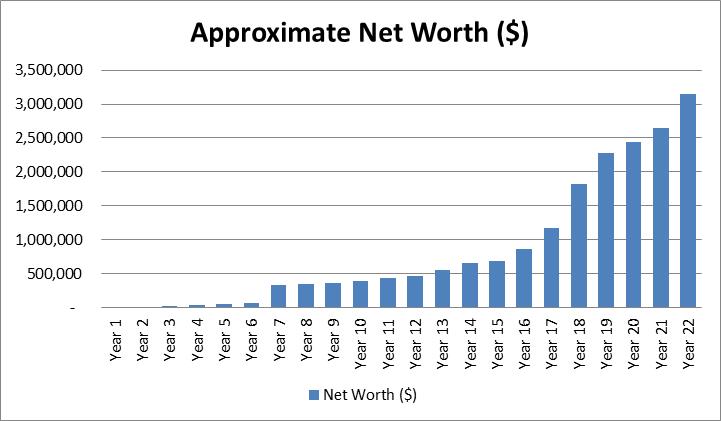
Today, my net worth is approximately $3.5 million. It took 20 years, but I got my net worth from $0 after graduating college to what it is today. It took a combination of conservative spending, saving, advancing my career to increase my earning power, and investing in different assets over time. The chart below shows the approximate growth in my net worth over the past 20 years:

You can see from the chart above that the growth in my net worth took time to materialize and was not linear. I earned, saved and invested from the moment I got my first job but it took time for everything to compound and grow. Here are some highlights (and lowlights) regarding the actions I took over time to try to increase my net worth:
- My growth in net worth started off slowly during the first six years of my career as I focused on building expertise in my career. I made $38,000 per year (before taxes) with my first job. I saved a good percentage of my after-tax income from the very start be keeping my expenses low and it allowed me to save a down payment for my first real estate purchase in 2002 (year 5).
- I made a career change in 2002 (went from working for a huge corporation to a small private business) that lasted until 2008 – it gave me a lot of additional experience with small business dynamics, sales and operations, but it did not have the financial upside I was hoping for. I still managed to save a significant portion of my income during this time but it was not a great career decision in hindsight. I probably lost some income and saving potential from this decision but I built additional skills and expertise during this time.
- My net worth popped in 2004 (year 7) as the home I purchased saw significant appreciation and I sold the home to get cash to invest in other opportunities. I avoided paying taxes due to the principal residence tax exclusion you get on the first $250,000 of gains and I had a housemate that paid for a part of my mortgage and housing costs while I lived in the home.
- I purchased a second property in 2005 (year 8) that I converted to a rental property. I continue to own the property today. I bought it for $450,000 and today it is valued at about $675,000. It is a break-even property from a cash flow perspective but it is close to become an income-producing asset for me.
- I purchased a third property in 2005 in Las Vegas. The investment was my worst one to-date. You can read about it here. I ended up holding on to the property for over 10 years but I lost some real money on that investment.
- I started law school in 2006 (year 9) but continued to work and generate income and therefore continued to add to my net worth. Importantly, I did not go into debt to attend graduate school because I chose a good school that was willing to offer me a scholarship.
- I saw an increase in my net worth from 2010 to 2015 (years 11 – 16) due to the purchase and sale of two real estate related investments. I had learned enough about finances and investments, and also I had learned from the mistakes I made when I bought a Las Vegas property in 2005, to see significant gains from these investments.
- I purchased stocks with my savings in 2009-2010 that appreciated over time and I made over a 50% return on these stocks.
- My net worth accelerated beginning in 2013 (year 14) after I began to see increases in my job-related income due to the expertise I had developed during the first ten years of my career. I continued to save 30%-50% of my after-tax income during this time. You will see in future posts that I recommend focusing building your skill set to become a valuable part of your company in order to see income growth that can accelerate your financial independence.
- I also worked for several companies from 2012 to 2019 that were sold after I joined them. The sale of these companies resulted in retention and severance payments for me because my services were needed to help with the transition but only for a limited period of time after the sales were completed. I saved almost 100% of these payments (after taxes).
- I invested some of my savings with a financial advisor in 2016 as I focused on my career and wanted more diversified investments. See my article on using an advisor.
The important take-away from my personal experience is achieving financial freedom does not occur overnight but if you develop a sound plan and implement it over a meaningful period of time you will make significant progress towards achieving financial independence. As you develop or review your own plan to achieving financial independence I suggest you incorporate the following principles:
- Save at least 30-50% of your after-tax income. You need the dry powder to get you investments started and growing. I’ve written an article on how much this helps on your journey to financial freedom.
- Avoid the big expenses in life. There’s nothing like the big expenses to make a dent in your savings. Some are unavoidable, such as a medical issue, but many are completely your decision on whether you incur them.
- Increase your earned income over time by building your skills and/or expertise or, if that is not possible in your field, find that source of additional income. I’ll be writing more on this later.
- Invest your savings early. If you have the bandwidth invest in what you know to increase your returns without increasing your risk, or be diversified among different asset classes to get solid returns without as much risk.
Everyone’s journey will be different – I had a 20 year corporate career in finance and law that I optimized to increase my income over time – but the principles above can and should apply to anyone that wants to get financially free. Be smart about your financial plan, learn from your mistakes and from others to optimize your approach, and be diligent in implementing your plan to financial independence.

Great advice and example.
Thanks, Anne.